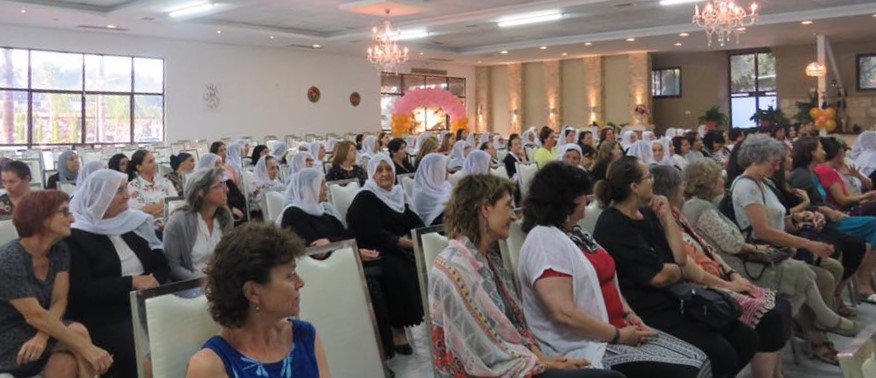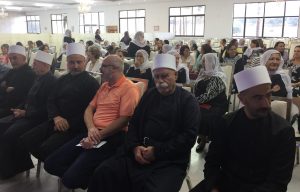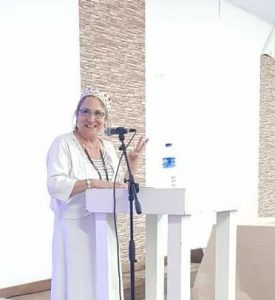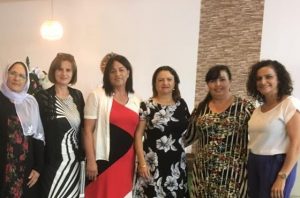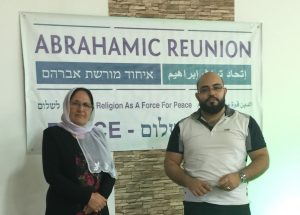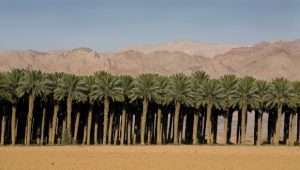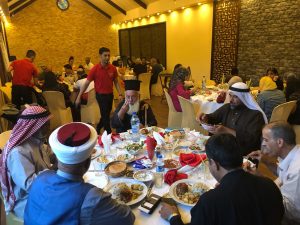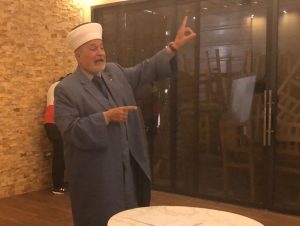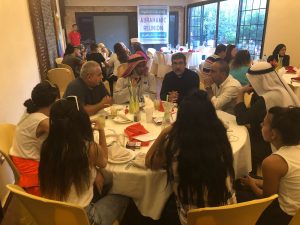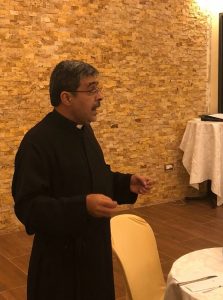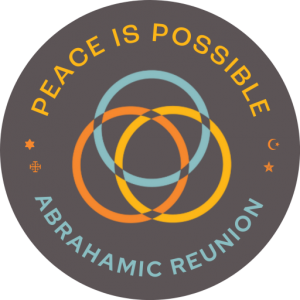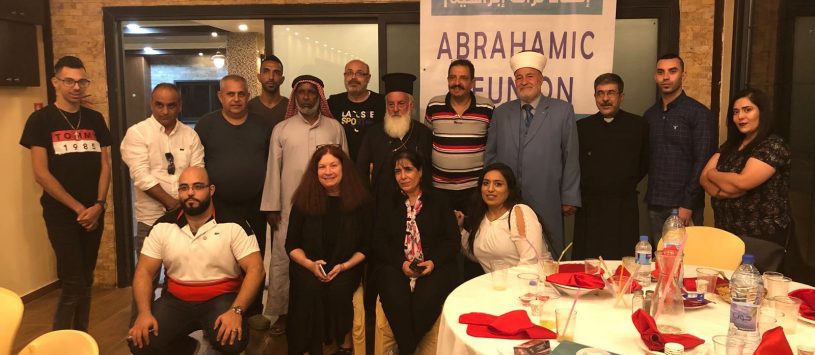
Blog 3: Family Forum Event
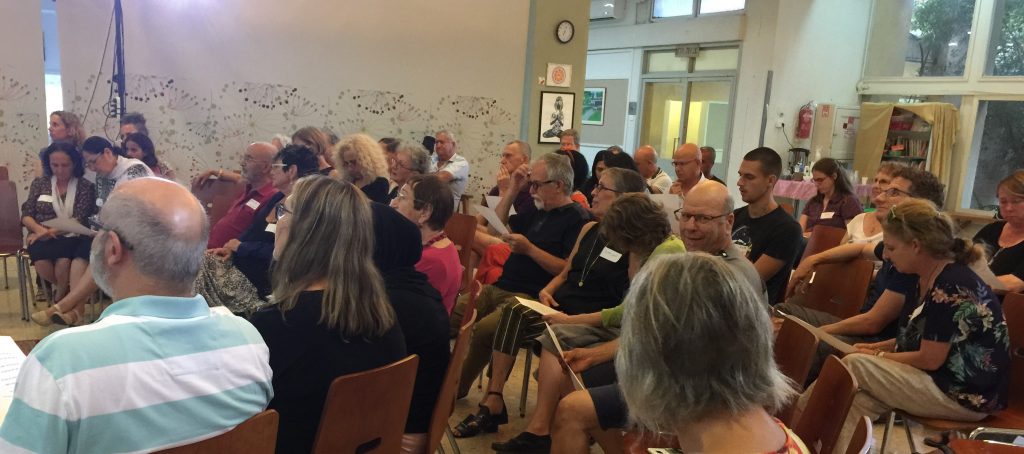 It is Monday afternoon and we have loaded the car with food and service items and we are heading to the Nigun Halev community in Kibbutz Gvat for a multi-faith Abrahamic Reunion “Families Forum” celebration.
It is Monday afternoon and we have loaded the car with food and service items and we are heading to the Nigun Halev community in Kibbutz Gvat for a multi-faith Abrahamic Reunion “Families Forum” celebration.
The Abrahamic Reunion’s Israeli Program Manager, Abed Manasra, has worked with organizers from the Nigun Halev community to create this celebration.
Today, mostly Jewish, Muslim, and Druze families will come together to provide an opportunity for their children to play together. They will study the mystical poetry of Jelaluddin Rumi, eat delicious food, and play music together. It is a celebration that will go far to heal some of the unease that has permeated the atmosphere in this region in recent months.
Kibbutz Gvat was founded in 1922 by pioneers from Pinsk, Poland, as a collective settlement in memory of 35 members from their Jewish community who were massacred by the Polish Army on April 5, 1919 in an event known as the “Pinsk Massacre.” It was a massacre that the Polish commander Antoni Listowski justified by saying “the town’s Jews as a whole were guilty of the crime of blatant ingratitude”.
Today approximately 1,000 people live in Gvat.
As we drive through the electronic gates into the Kibbutz, the first thing we see are the open barns of dairy cows being milked and fed.
In 1966, Kibbutz Gvat founded the Plastro Company, which has become one of the world’s largest manufacturers of drip irrigation systems. The Kibbutz’s beautiful wooded green yards and playgrounds are an almost shocking testimony to this technology in this arid region.*
Gvat was established on classical Labor Zionist principles and they say there has never been a synagogue in the village. But the Nigun Halev community rents a hall in Gvat to use a gathering place for members of their congregation. Nigun Halev is a spiritual community that was founded over 18 years ago by a dedicated group of visionaries, Jewish educators, and residents of the Jezreel Valley in the lower Galilee, who sought to create a framework for Jewish spirituality, to address the needs of non-affiliated Jewish Israelis. They named their community Nigun Halev, which means “Melodies of the Heart,” and it is considered to be the forerunner and model for a growing trend in Israel to develop unaffiliated Jewish communities.
Nigun Halev has over 200 members from the ages of 4 months to 80 years old who regularly attend their Kabbalat Shabbat services, and its members come from the kibbutzim, moshavim and small communities and towns throughout the region.
When we arrive in the parking lot, Nigun Halev Community members come forward to welcome their old friend Ghassan Manasra, the Abrahamic Reunion’s International Director.

Rabbi Leora Ezrachi-Vered
Once at the hall, Rabbi Leora Ezrachi–Vered greets us with warm hugs and invites us to add the food we have brought to the buffet tables at the side of the room. She directs us to the semi-circles of chairs facing a small stage arranged with microphones and instruments. Members of the congregation come forward and embrace us. I am amazed by their warm and sweet smiles. In heavily accented English and with obvious enthusiasm, they make a great effort to tell me about themselves and their congregation.
One lovely woman in her seventies takes me by the hand and pulls me next to her in the front row. She adopts me for evening, promising me that she will translate for me.
She tells me she was born here 75 years ago when her parents came from Poland and met and settled here. She also tells me she is a widow and that she has 17 grandchildren. She says she wants to spend this time in her life traveling, and she talks about visiting her family’s relatives, scattered around the world, who have made genealogy searches in an effort to find one another and reunite after they and their ancestors fled pogroms and wars in Poland. At one point, she shares that Nigun Halev “saved her life” and became her spiritual family after she was widowed.
She is a beautiful and kind person and we connect so deeply it is hard to stop talking even when the music begins.
Rabbi Leora sings in Hebrew while djembe player Ron Meitar and guitarist Shay Zarchi have the whole room clapping and dancing in welcome.
Finally after several songs, we sit down smiling and Rabbi Leora invites some people to accompany her and about 30 children to play outside in the playground. She invites Ghassan on to the stage, and hands him the microphone.

Shiekh Ghassan Manasra
Ghassan greets everyone in Hebrew and in Arabic and tells us about the activities of the Abrahamic Reunion.
He reads us some lines from Rumi, and then invites the room to break into conversation circles. He passes out written copies of the Rumi sayings translated into Hebrew and Arabic, and invites each member of the circle to choose their favorite saying and explain to the other members of their circle why that particular saying is meaningful for them.
As we prepare to break into circles I turn around and am delighted to see the room is packed with standing room only.
My adopted translator and protector immediately stands up and waves her arm inviting English speakers to come forward to form a group for me. I am amazed by her thoughtfulness, and vow to be more aware of the needs of people who visit my congregation in America.
My group gathers and they introduce themselves. Members of my group are both highly educated and sensitive. One works in biotechnology, one is a Shiatzu practitioner and spiritual healer, one is a tour operator, and my new friend volunteers with special needs children. They translate the sayings into English for me:
- Let the beauty that you love be what you do
- Travel brings power and love back into your life
- Silence is the language of God and the rest is a bad translation
- In the place where there is destruction, there is hope for the existence of treasure
- The wound is where the light can enter
- The beauty of the heart is the absolute beauty
- Everything that you are looking for is looking for you
- You were born with two wings, so why do you prefer to crawl through life?

Discussing Rumi’s quotes
Everyone in my group admits it is hard to choose something. They love all of the sayings, but one by one they choose something, and launch into a deeply profound and intimate sharing. They tell stories about themselves and their families, they speak about profound inner realizations and insights that they have experienced and adopted after passing through difficult life lessons. It is a deeply moving heart exchange as each one of us recognizes our self in the other.
Once everyone in the room has had an opportunity to share something, we are invited to fill our plates from the buffet. We sit with our new friends and talk some more. We go back to the buffet for seconds and thirds. We pour drinks for one another. We get one another dessert and coffee.
Finally the musicians begin tuning their instruments on the stage and we gather around as Jewish, Muslim, and Druze musicians and singers assemble to perform for the audience.

Sharing music together
Imam Helmi Hamad sings a beautiful love song to the prophet Mohammed. Abed Manasra plays the oud as Abed’s wife Su Su sings traditional Arabic songs. Jewish musicians accompany Basam Hadid, an amazing Druze singer and oud player. People in the audience whisper translations into the ears of their Jewish companions, and the Jewish members of the audience sigh and say they wish their children and grandchildren could learn Arabic, and learn this beautiful music.
In the end, Rabbi Leora invites everyone to sing the traditional Nigun Halev closing song together. Audience members wrap their arms around one another, close their eyes and sway as they sing.
As the evening winds down, people hug one another good-bye and exchange email addresses and phone numbers. They say they hope an event like this can happen again soon.
It is the next day, and as I prepare to leave Israel, the children where I am staying can’t stop talking about what a good time they had, and the games they played with the other children on the playground the night before.
*Image of Kibbutz Gvat by Avi1111 dr. avishai teicher – Own work, CC BY-SA 4.0, https://commons.wikimedia.org/w/index.php?curid=34973341
Blog 2: The Women’s Gathering in Daliat al-Karmel
We arrive for an Abrahamic Reunion Women’s Event in Daliat al- Karmel, the largest Druze town in Israel. This event has been organized by Abrahamic Reunion board member Siham Halibi, a Druze woman from Daliat, and Abed Manasra, the Abrahamic Reunion’s Project Manager in the Holy Land.
This event has been planned in preparation for Eid al Adha (The Feast of the Sacrifice) one of the holiest holidays in the Druze calendar, and also in Islam. Eid al Adha honors the willingness of Ibrahim (Abraham) to sacrifice his son in obedience to God. While Ibrahim was prepared to obey God’s command, God ultimately prevents the sacrifice, and sends a ram as a substitute. It is a story of profound significance for all of the people living in this region.
When we arrive at the hall where the event will be held Druze women are lined up at the entrance to greet participants, and hand out pens as gifts. Ultimately, 160 Israeli women arrive: 20 Jews, 35 Christians, 25 Muslims and the rest Druze.
Like all women’s events I have attended in the Holy Land, a mostly male panel of eminent speakers occupies the front row of the assembly. Siham and I and Rabbi Judith Edelman Green sit to the side and wait our turn to speak toward the end of the presentations.
Siham welcomes the packed room and serves as the master of ceremonies to introduce each eminent speaker and performer, including:
- Men:
- Hatam Halibi – Religious Judge for the Druze
- Sheikh Ghassan Manasra – International Director of the Abrahamic Reunion
- Rafeq Halabi – Mayor of Daliat al- Karmel
- Sheikh Allshakh Kasim – Official Spokesperson for the Druze Community in Israel
- Allshakh Monas Halibi –Reknowned Druze Singer
- Women:
- Siham Halibi-Abrahamic Reunion Board Member and Event Organizer
- Iman Nasr Alden – Civil Judge for the State of Israel
- Hayat Hazemeh – Poet
- Rabbi Judith Edelman Green – Rabbi and Author
- Jandark Haloon – Christian Speaker and Singer
Many of the speakers talk about the “Jewish Nation-State Law” a new “Basic Law” that was passed by the Israeli Knesset on July 19. Basic Laws are the constitutional laws of the State of Israel and they can only be changed by a supermajority vote in the Knesset.
The controversial “Jewish Nation-State Law” became Israel’s 14th Basic Law and it legally enshrines Israel’s Jewish character and makes it one of the state’s guiding judicial principles, akin to a constitutional amendment in the United States.
The new law states that Israel is “the national home of the Jewish people,” that only Jews have a right to national self-determination in Israel, that Jerusalem is the capital of Israel, and that Hebrew is the only official language – downgrading the official status of Arabic.
Among its other provisions, the most contentious one says: “The state views the development of Jewish settlement as a national value and will act to encourage and promote its establishment and consolidation.” Critics fear this deliberately vague language could be used to legitimize Jewish only communities, and the development of exclusive towns.
The one thing that proponents and opponents of the nation-state law agree on is that its passage is of profound and historic importance – representing a milestone in Israel’s 70-year history. To read a full translation of the law, click here.
When Rabbi Judith Edelman Green finally stands at the podium and expresses a commitment to a diverse and equal Israel. The Jewish participants in the audience all stand in solidarity and applause erupts around the room as people try to reassure themselves, and affirm those values.
When the speeches end, a room divider is opened and the women are invited to sit at the food-laden tables on the other side of the large hall. The men sit together separately at two tables in the front of the room, while the women take seats around 30 other tables. I join a group of Christian women who invite me to sit with them. They say they are from a Druze town nearby and explain that they are a minority in their town, where about 1,000 Christians live peacefully together with 15,000 Druze.
One of the women introduces herself and says she is a guidance counselor in the town’s high school and is the head of a women’s group that volunteers to bring elderly Druze and Christian women together for interreligious activities.
She seems a bit sad and I ask her how things are going these days and she says, “ I am worried and I am pessimistic.” I ask her why and she says that since the new law has passed she fears “the worst”. I ask her what she fears, and she says she fears being “transferred.”
“Where?” I ask her. She sighs and says “You know Netanyahu says two states for two people.” The other women at the table have been listening and they all nod. They all seem worried. After an awkward silence, the conversation shifts to a discussion about our children and one woman shares that her son has been living in Barcelona and says, “He loves it there. “ I ask, “What does he like about it?” and unexpectedly she explains that in Barcelona he feels everyone is equal and it doesn’t matter what religion you are. I ask if he grew up feeling equal here and she says, “No” and as she shakes her head, she adds, “no matter how hard you try here, you never feel equal.” The other women at the table nod again.
I ask if they ever think of leaving, and a few admit that since the new law has passed they have been making plans to visit relatives who live in other countries to explore what options may be available at least for their children. They explain that they do not want their children to live in a place where they do not feel equal. It is a sobering conversation. In all my years of visiting Israel I have never heard such despair expressed so openly, with no pretense of optimism.
As the night ends I walk to the car and I look up at the stars and think about the words of one of my teachers who once said, “Of course God created different religions, how terrible it would be if you had an orchestra with only pianos!” I realize the work of the Abrahamic Reunion has become harder, but is more needed than ever.
Ghassan Manasra, the Abrahamic Reunion International Director, sends a special thanks to Siham Halibi and acknowledges her as one of the great interfaith organizers in the world.
Blog 1: Sacred Text Study in Jericho
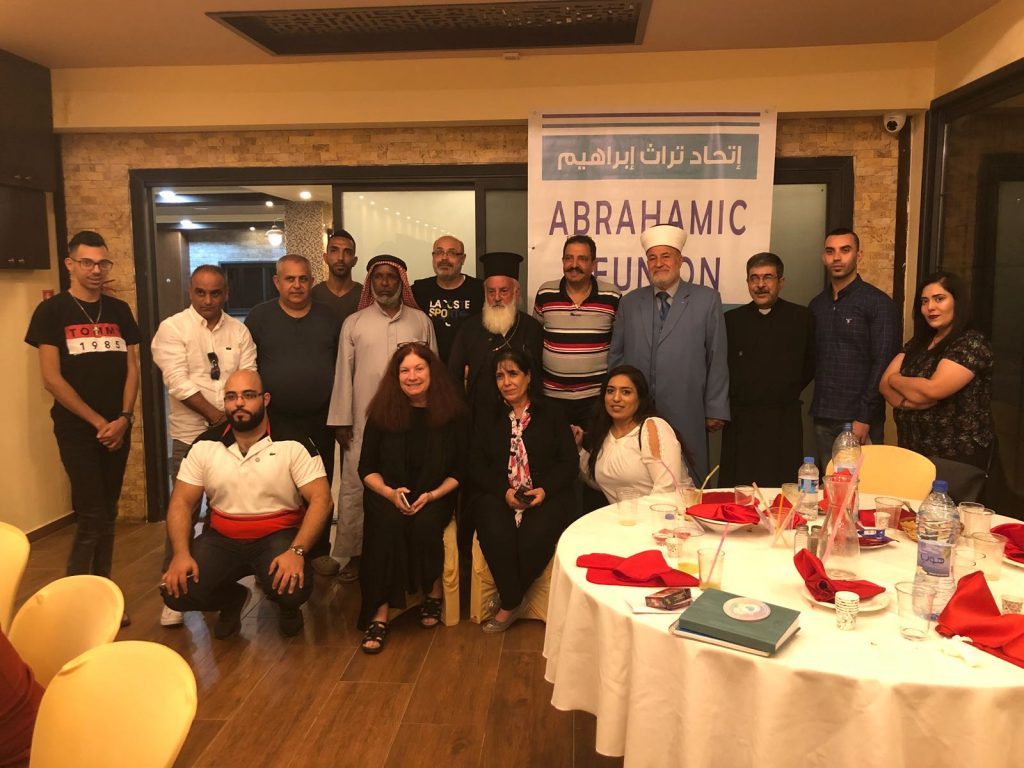 We pile into the car in Nazareth, Israel and head across the border for Jericho, to participate in a multifaith text study group organized by the Abrahamic Reunion’s Palestinian Director, Mohamad Jamous.
We pile into the car in Nazareth, Israel and head across the border for Jericho, to participate in a multifaith text study group organized by the Abrahamic Reunion’s Palestinian Director, Mohamad Jamous.
Abed, the Abrahamic Reunion’s Israeli Project Manager is driving; Ghassan, the Abrahamic Reunion’s International Director, is at his side. I am sitting in the back with Abed’s wife Su Su and their young baby. As we make the two-hour drive, we pass groves of Medjool date trees. Mesh bags protect massive bunches of the nearly ripe dates growing on row after row of towering, perfectly matched trees. Ghassan explains that Israel is the producer of some of the best quality dates in the world.
Grown on annexed Palestinian land in the West Bank, Israel is one of the biggest exporters of dates to the wealthy Gulf States. On the other side of the road, opposite the Israeli groves, are the struggling Palestinian date groves. The fruit on the stunted and mismatched trees is uncovered, and many of the trees seem barren. Ghassan winces at the contrast and explains that the Palestinians lack the resources and infrastructure to produce dates for export. He says their dates will be sold in local markets for a fraction of the price.
Abed and I traveled this same road just two months ago when we headed to Jericho to celebrate the Abrahamic Reunion’s multi-faith Iftar event. As we drive along today we see a number of new building sights being leveled for the construction of Israeli settlements.
Abed explains, “A lot has changed since our last trip together to Jericho. Since the new law has passed, our work has become much harder as fear, tension and frustration among the Arabs has grown. “
Abed is referring to the new “Basic Law” passed by the Israeli Knesset in July. It is Israel’s 14th “Basic Law”, which for the first time in Israel’s 70 year history, enshrines Israel as “the national homeland of the Jewish people.”
Although 20% of Israeli citizens are Arab, the new legislation makes no reference to equality for all Israeli citizens like the one made in Israel’s Declaration of Independence — which pledged that the state of Israel would “ensure complete equality of social and political rights to all its inhabitants irrespective of religion, race or sex.” A full translation of the new law can be read here.
Finally, we arrive at the restaurant where our meeting will be held. I recognize several of the priests and Imams who have lined up in front of the restaurant to shake hands and greet the participants as they arrive.
I am not sure what to expect when we enter the private room where the Abrahamic Reunion is hosting its text study session, but I am delighted to realize that 40 people have come, and surprisingly this time Christian participants outnumber the Muslim participants. It is a big achievement for our event organizer, Abrahamic Reunion Palestinian Director, Mohamad Jamous.
Because it is easier for Christians to immigrate to the West, many have left the region and now less than 2 % of the Palestinians in the West Bank are Christians. Mohamad Jamous had to really reach beyond his familiarity with his own Muslim community to cultivate these relationships.
One by one the presenters and religious leaders introduce themselves and begin to speak. These speakers are:
- Father Firas Diab – The Melkite Catholic Priest from The Melkite Catholic Church of Zababdeh, Palestine
- Father Tuameh Dawood – The Greek Orthodox Priest from The Greek Orthodox Church of Zababdeh, Palestine
- Amad Abu Shelbay – The Imam from Zababdeh, Palestine
- Sheikh Ghaleb Awatleh – The Mufti on the Palestinian Religious Authority
- Jeres Awad – Artist for the Anglican Church of Palestine
- Sheikh Imad Abu El Shalabya- the Imam of Masjid Al Zababdeh in Zababdeh, Palestine
- Sheikh Mohammed A-Saeed Salah – The Mufti of the Palestinian National Security Forces
- Sheikh Ghassan Manasra- Sheikh of the Qadiri Sufi Order in Israel and International Director of the Abrahamic Reunion
- Mohamad Jamous – The Palestinian Director of the Abrahamic Reunion
- Sheikh Abed Manasra – Project Manager for the Abrahamic Reunion in the Holy Land
They each speak with a loving depth that cuts through the current political atmosphere and causes people to re-experience and affirm their core human values of love for one another.
The eminent Sheikh Mohammed A-Saeed Salah is the Mufti of the Palestinian National Security Forces. A Mufti is a Muslim legal expert empowered to give rulings on religious matters. After welcoming everyone, he thanks me as the sole American participant for the financial support that Americans have given to enable this multi-faith event to happen. In a world where Palestinians feel unseen and unheard, coming together and experiencing being seen by each other is particularly life affirming and eases their sense of isolation.
Ghassan translates the Mufti’s talk for me:
“It is very important to have these meetings so we can express our unity and our connection. We don’t need to say that we are Christians or we are Muslims—we need to recognize that we are all Palestinians. It is important that we touch one another, and feel one another, and know one another and understand one another.”
He goes on to share many stories of Muslim and Christian co-existence and cooperation in Palestine.
He also tells a personal story about how a Christian boy in his neighborhood started a fight with his daughter over their religious differences. He describes how the fight escalated to include more young relatives and neighbors until more and more people in the neighborhood were becoming involved. Then he explained that the mother of the Christian boy, because she trusted the spiritual wisdom of the Mufti, and trusted him to be a fair mediator, ultimately sent her son to the Mufti to resolve the issue. The Mufti described how he brought together the neighboring Christian and Muslim youth, who had been fighting with one another, and told them:
Never say “because I am a Muslim,” or “because you are a Christian.” You must say instead, “because we are Palestinians… “ Do this and it will be the last time you will have a problem between you, because long ago we used to live together peacefully.
The topic of today’s text study is the “Holiness of Life.”
After reading the texts aloud, the Christian and Muslim clergy join tables of participants who have broken into multi-faith groups to discuss the texts more deeply. The clergy each sit at the different tables to answer questions and serve as references. People introduce themselves. A Palestinian man from Bethlehem tells me he has lived in Canada for the last 18 years, but he has moved back to Bethlehem to take care of his ailing mother. He has become very involved with the youth at his Baptist church and explains that their congregation helps support their Muslim neighbors so they can participate in the Hajj. He says that because Palestinians have no airport, it is not easy for the Muslims to pass through all of the check points to leave the country so they can go to Saudi Arabia on Hajj. So the Christians in their congregation volunteer to drive their Muslim neighbors through the check points to Jordan and Iraq and even to Syria, so that they can board planes to Saudi Arabia. The Christian drivers bring the youth from their churches with them so they can talk to their Muslim passengers and learn about Islam. They feel it is their duty as Christians to support their Muslim neighbors, and also to teach their own youth to be accepting of people who believe in their same God, but who worship that God in a different way.
The Muslim woman next me introduces me to her Christian companion and says they are best friends, and explains she has heard about this text study program from her Christian friend.
It is amazing to hear both Christians and Muslims using Arabic to discuss their texts. Arabic is a language that most Westerners associate only with Islam, so hearing Christians using phrases like “Allah Ho Akbar” and “Alhamdulillah” shatters many cultural stereotypes and causes one to experience the message of God liberated from culture, and religion, and even from language.
On the break between the text study program and the shared meal, Father Firas, the Melkite Catholic priest who often participates in Abrahamic Reunion events, tells me he travels around the world speaking to different congregations about the Palestinian people. He hopes to dispel the erroneous perception that Palestinians are violent religious fanatics, and he tries to let the world see that they are loving people who have the capacity to love all people, including their Jewish neighbors. I ask him if he speaks to Jewish congregations, and if they are open to his message. He says, “No, so far the organizers of my speaking tours in various Western countries have not thought that would work out.” But he says he is hopeful that some day he will have an opportunity to visit a synagogue and speak there. I admired this man and his commitment to the path of love.


